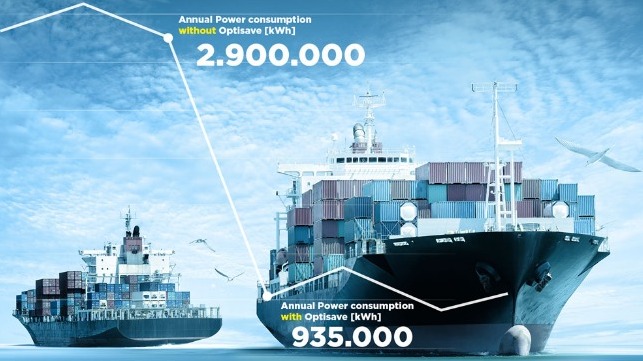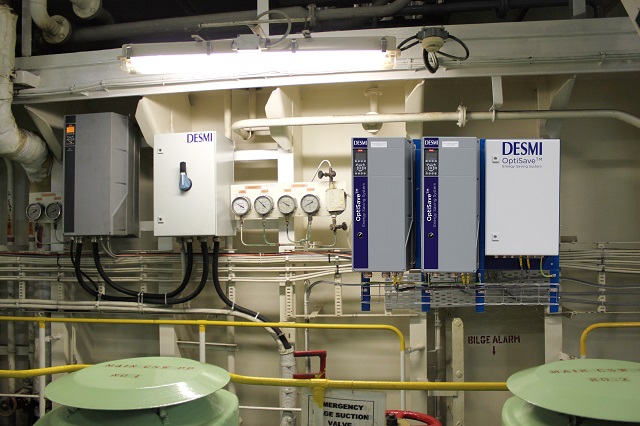Energy Efficiency: Totally Worth It

With a little careful planning, you can adopt some surprisingly effective energy-efficiency measures for your newbuilds, saving a lot of money in the long run, while also greening up operations.
A changing marinetech climate
New regulatory guidelines in recent years have progressed innovations in marine technology. Both vessel and equipment manufacturers alike have introduced solutions that answer the call of the IMO and EEDI (Energy Efficiency Design Index for new ships) to decrease energy consumption and emissions. Additionally, organizations such as the Danish-born Green Ship of the Future (GSF) are promoting the idea that emission-free maritime transport is an achievable near future for the industry, and financially sustainable, through the use of both existing, energy-efficient technology and also R&D into new digital technologies.
Efficiency solutions are win-win
When they hear the word regulation, people inevitably start wondering what it’s going to cost to fall in line. It’s important, however, to understand that, in this case, green initiatives can actually create powerful opportunities for savings, while also protecting the environment. That’s because when it comes to regulatory changes in the marine industry, a lot of the impact falls onto fuel consumption. Fuel is the most expensive component of the maritime business model, representing up to 60-70 percent of total ship operating costs in times when fuel prices are higher.
That means that an investment in energy-saving solutions can actually help shipowners improve their bottom line by lowering fuel consumption annually. As the American author and commentator Bill Vaughan mused, “improving efficiency is not only a risk-reduction strategy, it's a profitability strategy.”
Intimidation factors
There are a lot of choices! Whether you’re from a marine background or totally new to the shipbuilding experience, because the development of new equipment is constant, it can be difficult to weigh the options when outfitting a new ship.
Shipowners are often presented with a small list of potential manufacturers, in a sort of “package deal” arrangement, representing a range of prices. Not often are equipment choices presented in an “a la carte” style. And with good reason – comparing the pros and cons for an inclusive list of shipbuilding elements would be both intimidating and time intensive, for anyone.
So, what options do we have to make the biggest efficiency savings?
Engine room opportunities
By far, the greatest opportunity for improving fuel efficiency is in the engine room. While in some ways, one engine room pump may appear to be much like another in overall specifications, efficiency performance can, nevertheless, vary by as much as 10 percent. Down the line, a decision to use the most efficient pump on the market can translate to as much as a 25 percent fuel reduction. So, it is important to consider what the manufacturer can deliver in terms of state-of-the-art pump design.
Additionally, while there is always a premium around onboard space, prioritizing efficiency in piping design and other engine room infrastructure can greatly offset upfront sacrifices with savings down the road.
Too often, we see corners cut in piping design, and it can seem easy to save money by choosing cheaper, smaller diameter pipes for your newbuild. But, over time, higher pressure in the pipes reduces the lifetime of both the piping and the associated equipment, resulting in much higher long-term costs by way of unnecessary maintenance or even loss of equipment. Cavitation, for example, can demand early replacements, which could be avoided by choosing the optimal pipes sizes during installation.
Reuse and recycle
By choosing equipment that is systemically useful in the ship, it is possible to reuse and recycle some of the heat generated by the engine room equipment and reduce fuel consumption.
Reusing engine room waste heat to keep a stable temperature in the cargo tanks for tankers can greatly improve total ship efficiency. Implementing a system like this onboard needs to be carefully planned, but in the long road, an increased efficiency of up to 82 percent and big gains on the bottom line make thinking ahead well worth the effort!
For example, installing a pump/fan control system, such as DESMI’s OptiSave™, can reduce the overall power consumption to a level where other power-consuming equipment and systems can be operated without increasing the overall fuel consumption of the vessel’s auxiliary engines. This means significant savings in the power normally needed to operate the vessel in accordance with the required operational profile.
Working smarter
Automation also has an impact on fuel efficiency, which is another area in which DESMI’s OptiSave™ has proven its worth. Installing programmatic technologies onboard ensures that your pumps will never work harder than they have to. This is made possible by optimizing pump and fan speeds to the current conditions in order to save fuel, for example, up to 300 tonnes a year for a bulk carrier of approximately 60,000 DWT.

Maintenance delivers results
It cannot be understated that it pays to invest in quality. Whether you are buying for your newbuild or retrofitting a ship that is already on the seas (it’s never too late), choosing your manufacturer carefully can avoid a lot of unnecessary costs in terms of maintenance and replacement of parts and equipment, not to mention losses due to service docking.
While it’s intimidating to undertake, choosing a more a la carte approach to equipment selection for your newbuild can really pay off in the end. And while we all know that it’s worthwhile to think about total cost of ownership when choosing equipment, it can also be hugely economical to think about the ship as a total system. From the engine room to the ballast cooling system and cargo hold, how can the separate components function together to create the best potential for fuel savings?
Efforts like these, which green up your shipping operations, will also weave nicely into your company’s sustainability story. And that’s good for the environment and your bottom line!
Want to know more?
John Kristian Pedersen
Segment Director, Marine & Offshore
DESMI Pumping Technology A/S
+45 96 32 81 72
+45 20 20 55 29
jope@desmi.com
John Nielsen
Key Account Manager
DESMI Pumping Technology (Suzhou) Co. Ltd.
+86 21 6071 0613
+86 139 1407 0587
jni@desmi.com
The opinions expressed herein are the author's and not necessarily those of The Maritime Executive.
